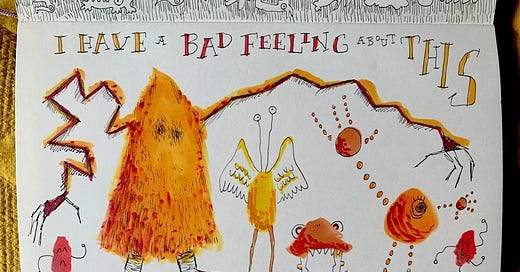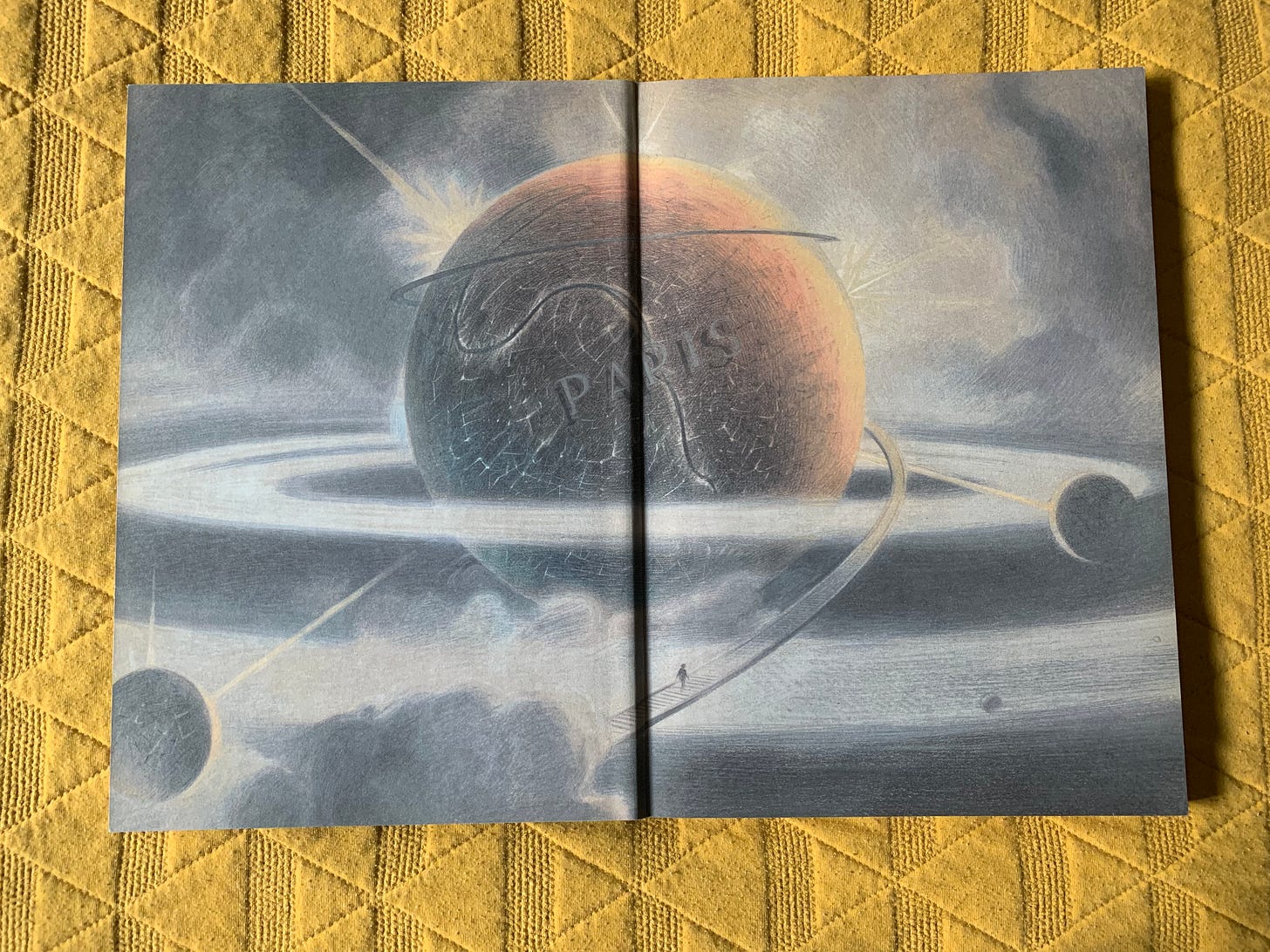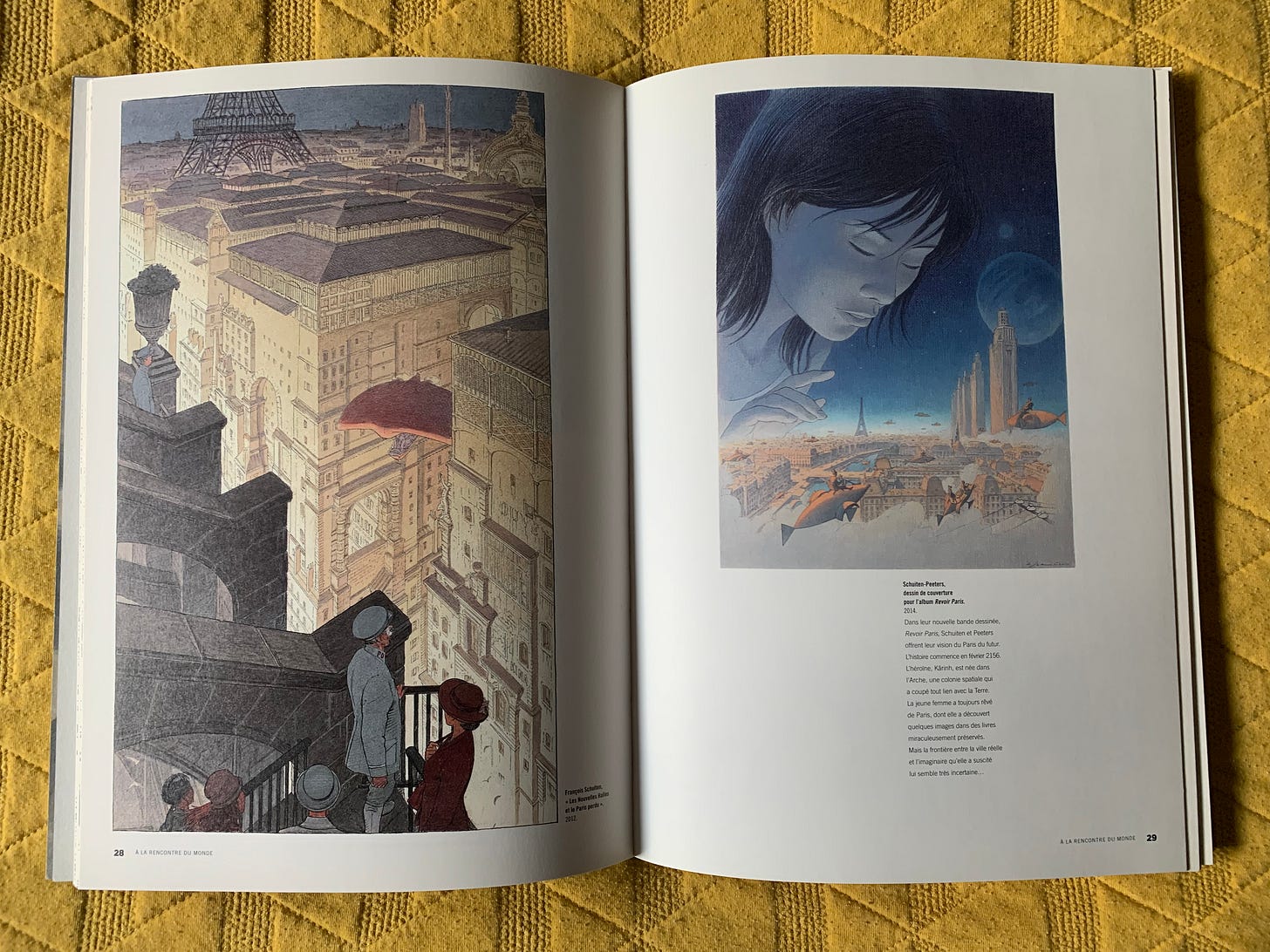One of my favorite Substacks right now is Today in Tabs. Rusty Foster is (like Garbage Day’s Ryan Broderick) the perfect Virgil for today’s internet hellscape - funny, erudite, cynical, and yet perennially hopeful enough that he keeps going back to uncover and explicate the memes, trends, and tech kerfuffles that reflect and define our sticky little moment in time - all so I don’t have to do it myself.
Foster’s post yesterday explored the concept of what exactly we should CALL this sticky little moment in time, in which so many variegated styles of crap are being flung in all directions at once, all as the bottom slowly opens up beneath us. What I love is that the choice he makes among multiple options considered is the one I’ve spent years suggesting to anyone who expresses mild apocalyptic musings within my earshot: the Jackpot, as described by William Gibson in his 2014 novel The Peripheral.
The Jackpot isn’t a single catastrophe, but a sort of slow-motion catastrophic stew, in which all the different flavors of cataclysm interact and infuse each other’s flavors into a fragrant mix that gradually kills off 80% of the human population. As Foster quotes from the book, the Jackpot is:
…nothing you could really call a nuclear war. Just everything else, tangled in the changing climate: droughts, water shortages, crop failures, honeybees gone like they almost were now, collapse of other keystone species, every last alpha predator gone, antibiotics doing even less than they already did, diseases that were never quite the one big pandemic but big enough to be historic events in themselves.
What I keep saying is that the notion of a singular, transcendent moment of armageddon is romantic and naive. Civilization is fighting a battle of attrition, and we’re going to get smacked in the face with whatever the world has in its arsenal - a process sped up, of course, by our own staggering follies.
Somehow I find this the most hopeful option available.
In Gibson’s world, after the worst of the misery passes, there is still a world. There is beauty, joy, mystery, art. Life is no longer a struggle for survival, but it’s unspeakably weird and sad. Things can get bad again, but there’s a sense of rebuilding. Humanity has survived a major convulsion, and may be strong enough to survive more. It beats something even worse, I guess.
As the newsletter name implies, Today in Tabs focuses mostly on what “the Internet” is talking about du jour, but the column in question is a great example of the delightful occasions when Foster’s posts veer from media/tech into literary criticism - it’s an excellent read, which eventually settles into a meditation on how we all live now in Cormac McCarthy’s bleak, brutal, but strangely graceful world - and how, as with the Jackpot, there are ways we can make the best of it.
In discussing McCarthy, Foster brings in a quote from Heather Havrilesky’s Ask Polly newsletter, in a piece that hit me right in the gut with its hard-won wisdom about the challenges and bleak joy of trying to give a crap about anything while trudging through middle age as a self-doubting has-been/never-really-was. In particular, she writes about the slog of trying to improve her singing with a vocal coach without harboring any ambitions of doing anything beyond just improving, for its own sake:
… your stated goals in pursuing your passions might end up being a sideshow to the real satisfactions of process: immersing yourself in borderline absurd practices, habits, and behaviors that don’t achieve much, that look laughable or foolish to others, that appear as a burden or an unnecessary hassle on the calendar, but that bring you mysterious peace and calm and a sense that all is well in the world. What could be more rare in this world than that?
Everything she describes in this must-read column sounds a lot like the way I approach this newsletter. Or my slow, plodding efforts to get healthy by running. Or my creeping return to a modest form of theater production, as embodied by last Sunday’s encore performance of The Nerve. We had an audience of about 15, and it’s anyone’s guess when Bob and I will do the show again - it’s never going to be on any radar wider than that which encompasses this newsletter - less, even, because not all of you live in NYC. And that’s okay! As I wrote earlier, my reasons for doing this kind of thing are subtler and more complicated than they once were, and the satisfactions are very different than what they used to be. A perfect storm of resignation, relegation, and resilience. A jackpot!
Alright, this is supposed to be a gallimaufry, so let’s gallimaufrate.
I’ve continued plowing through some quick-read graphic novels in my collection to clear space on my shelves. Here’s some of what I’ve been spending time with:
I liked many of these - some very much! - but I’m only gonna hold onto a couple: Alay-Oop (a wordless Depression-era graphic-novel pioneer by political cartoonist and illustrator William Gropper) and Samaris, the first of the Obscure Cities series by the Belgian team of artist François Schuiten and writer Benoît Peeters. I’m a sucker for stories loaded with speculative architecture in which the city itself plays a leading role. Very interesting to read shortly after their book returning from the fictional city of Paris, France.
In fact, the first time I encountered the work of Schuiten and Peeters was on a visit to Paris nine years ago. I saw their book Revoir Paris in a shop window and I had to get it. It turns out to have been a catalogue of an exposition they curated at La Cité de l’Architecture et du Patrimoine, which features their own work interspersed with other visions of speculative Parises from throughout history. It’s all in French, but beautiful to revisit
Second best to a labyrinthine cityscape is an urban labyrinth contained within the walls of a single building. What institution better fills that description that the Metropolitan Museum of Art? This week I finished reading Information Desk: An Epic, by Robyn Schiff, who once worked at the eponymous desk at the Met a few decades back. Her book-length poem mines her experience there, along with evocative descriptions of pieces within the collection and their thousands of points of diagonal intersection with some of the oddities of the natural world, anchored by descriptions of a wild array of parasitic wasps(!) that demonstrate the predatory symbiosis that allows maker and made, have and have-not, pillaged and pillager, to inhabit - and occasionally even flourish - in the same culture.
One of the Met’s most iconic paintings is Ingres’ 1851-53 portrait of Joséphine-Éléonore-Marie-Pauline de Galard de Brassac de Béarn, aka Princesse de Broglie, an aristocrat with whom which Schiff spends a good few pages, including this passage:
Oh Princesse! Why don’t I feel more for you? Your early death, your blue dress everyone wants to taste, and the restrained sadness that droops your eyelids as if you’re a little high or hiding something big and willing yourself not to scream. I want to love you, too, but I’m too jealous of how your opera gloves, nonchalantly filled with having just been to the opera, are slung over the arm of the chair you’re leaning on to reveal how your elongated ungloved fingers taper into tips so attenuated you could pick a different lock with each and simultaneously enter ten different exclusive realms of being, unlimited by time, gravity, birth, or money. I flew first-class once!
I have never flown first-class myself, and I will never be a first-class poet like Schiff. But I’ve seen those photorealistic silk folds in person, and let me tell you, the world is better for them despite the awfulness of empire they can be interpreted to represent.
After this week’s post about my listening habits, I wanted to make good on the prominent role music still plays in my life by figuring out how to write about it a bit better. An album that has caught my ears in the five months since I put it on my list is Good Living Is Coming for You, by the Kansas-based post-punk duo Sweeping Promises.
I broke out from my usual routine and listened to it several time this week in order to figure out how I felt about it. Turns out I really like it! But I still don’t quite know what to say. Maybe let me just list out a few things about it that appeal to me.
I love arrangements that are pointy but still have a little tooth to them - like a knife, but serrated in a kind of crunchy way. The songs feel well-crafted, but there’s a looseness to the production that keeps things excitingly tense.
The multi-track harmonies from the lead singer, Lira Mondal, sometimes make her seem like a one-woman B-52s.
One of the songs is called “Connoisseur of Salt,” and I really appreciate that. Per this Pitchfork profile, Modal is a former pastry chef, and the band’s lyrics are full of what her partner Caufield Schnug (SERIOUSLY?) calls “food surrealism.” Kinda like one of my favorite underrated B-52s tracks. This song includes unironically awesome saxophone bleats, which apparently I have a huge appetite for in my spiky pop music these days.
The lyrics also have a lot of opinions about about gentrification and bourgeoisinization (an actual word). Take the album’s title - according to the band’s liner notes (do we still say that?), “At first glance, this nouveau wave slogan offers hope wrapped around relief. At first listen, we realize this may actually be a warning. Darker still, a threat.” That sense of relentlessly jaunty menace stalks every note of the album.
The CMYK test-pattern album cover speaks to the anal-retentive/Bauhaus spine that wends its way up through the messier, hairier bulk of my imagination.
Is that enough? Did it make you want to listen? Am I a music critic now?
Anyway, we should all be so lucky to have the corporate lifestyle homogenization be the worst problem we have to face. It beats having our asses blown to atoms in Gaza - or getting shot, taken hostage, and tortured by terrorists while going about our day - for the crime of having been born in the wrong place at the wrong time, innocent victims of history’s bloody reverberations.
I do wonder on the regular how long we can keep this up - our focus on the pleasures of the senses, the yearning for self-fulfillment. At the moment, it’s very easy for many of us - including probably most of you - to keep the horrors at bay. I look at the news every day, and read about Gaza, about Ukraine, about the Republicans, about the climate, and then I - quite easily - put it out of my mind in favor of the sort of stuff above, which I’d SO MUCH rather be thinking about.
I’m not entirely sure why I feel moved to mention all of this here, way down at the bottom of an email that fairly few of you are probably going to read straight through. Guilt, I guess? I feel like I should be devoting all of my time to countering any number of other injustices, but I don’t know how, and, frankly, I’m not strong or decent enough. It’s overwhelming to watch one horrible thing lead to an even more horrible reaction, which leads to even more horrible reactions, fearing that the entire flood of pent-up rage and terror our species has barely been holding in all these years is going to come spilling out all over the place like a slot machine full of poison quarters - a jackpot, as it were.
Anyway, if I knew what to do about the problem of the powerful men on all sides who indulge in the worst predilections of human nature and bully others into doing the same, I wouldn’t be sitting around writing a twee little newsletter filled with arts, culture, and quirky personal observations. At what point are things going to get so bad that there’s no longer going to be time and energy for this kind of thing? How horrible am I for being desperate to hold onto it for as long as possible?
Anyway, nobody said every item in a gallimaufry was going to be fun. The truth is I feel pretty good today - I had my annual physical yesterday, and my doctor said I’m healthier than I was last year, so I’m pretty grateful for that. But feeling good amidst so much that’s bad doesn’t always feel good.


















Among other things, the pando taught me that when the Slo-Mo Apocalypse arrives we’ll still somehow have to go to work everyday through it all.